The requests that the National Union of Journalists of Ukraine (NUJU) receives from local media located in the front-line and de-occupied territories are not huge; they are realistic to fulfill, NUJU President Sergiy Tomilenko said during a recent extended meeting of the Union‘s Board.
“I will give an example of the Trudova Slava newspaper from Orikhiv, Zaporizhzhia Region, which at one time was supported by the journalistic community during denationalization when local officials did not let it go from under their control. With the support of the NUJU and thanks to the partner assistance from foreign investors, Trudova Slava is delivered to its readers in the challenging conditions of hostilities,” Sergiy Tomilenko emphasized.
And it should be said that the Orikhiv city newspaper is not the only one that received aid for the resumption of its publishing. So far, we are talking about 28 newspapers from the front-line territories that received financial aid from foreign partners.
The NUJU First Secretary, Lina Kushch, who oversees the work of the NUJU‘s Journalists’ Solidarity Centers (JSC), added to the opinion of the Union President:
“Thanks to the support of the Japanese government, as well as the international development and communication program of UNESCO, two new directions in the activity of the JSCs began to operate in our country. One of them is a mentoring program to support 27 newsrooms from de-occupied and front-line territories.
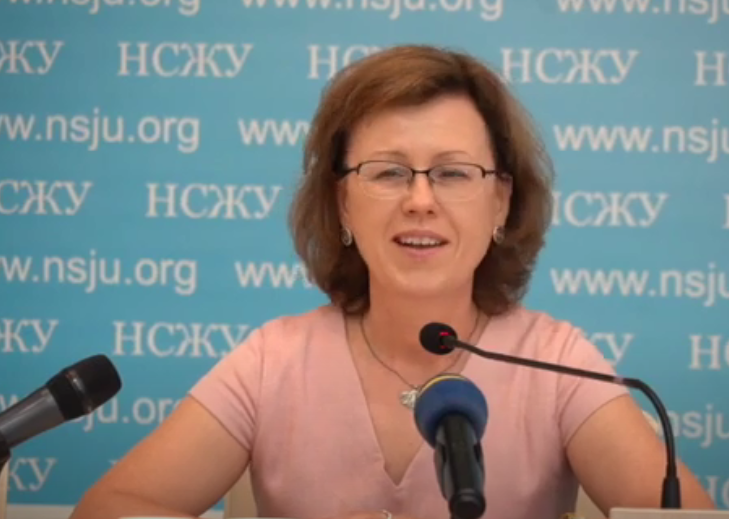
Over the course of several months within the program, our colleagues gain knowledge on how to raise funds for the newsroom, improve the content, and adhere to journalistic standards. Colleagues are interested in learning about digitization and the use of digital platforms in their media.
Within the framework of this project, a two-day seminar of editors from front-line and de-occupied territories was held. This is the first time since the beginning of the large-scale invasion that we have gathered courageous colleagues in Kyiv. We were delighted that with the support of NUJU and foreign partners, they have become more confident in the future of their newsrooms, work with inspiration, and are happy that they can be helpful to their readers.
The second direction, which we have added to the activities of the network of JSCs, is cooperation with the Armed Forces of Ukraine (AFU) and law enforcement agencies. We conduct a dialogue as for improving the working conditions for Ukrainian and foreign journalists covering the situation in the war zone.
In particular, we resolve the issue of accreditation and communication, the issue of journalists’ access to certain zones. This is a large and often not public work, which, you can believe, has its results.
After the introduction of new rules for the accreditation of journalists in red, orange, and green combat zones, most commanders began to declare their zones of operation red. They do this only in order not to deal with journalists and not to be distracted by journalists. This is unfair and wrong.
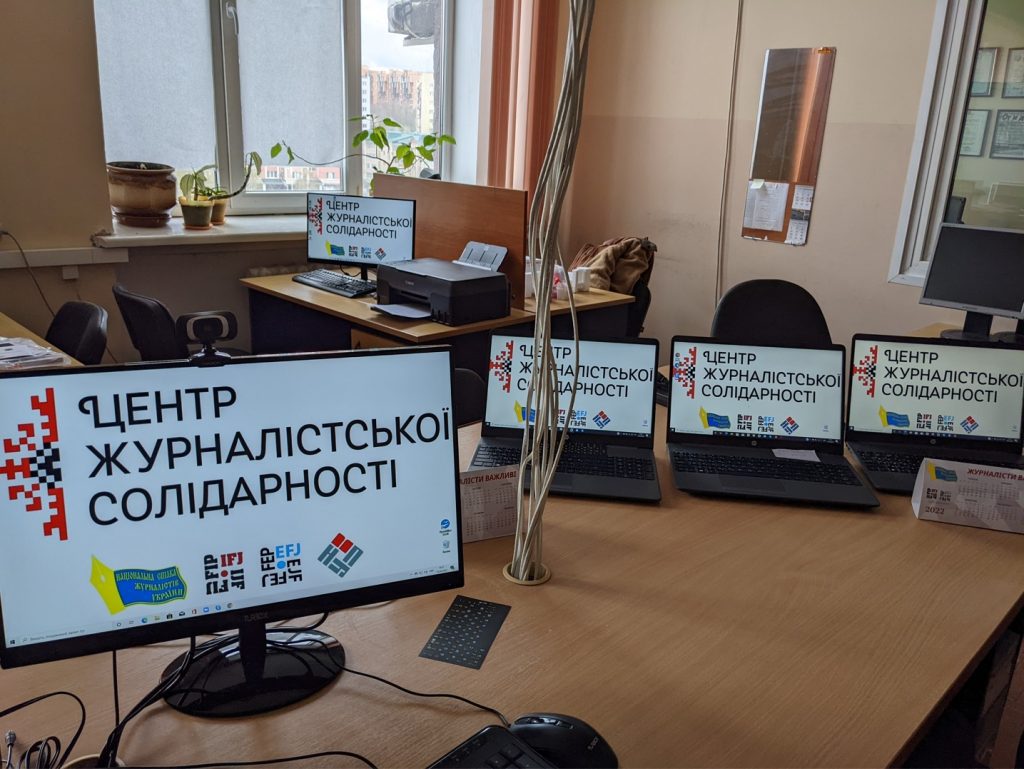
Therefore, the NUJU tirelessly explains why it is essential for journalists to cover what is happening at the front. Our team is working on recommendations to improve accreditation rules and communication between military and civilian journalists.
At the international level, since recently, we have been observing how the attention to the problems of Ukraine and the problems of Ukrainian journalists is somewhat decreasing. We cannot help worrying, so the JSCs try to work as actively as possible so that foreign colleagues know as much as possible about us.
The first is the organization of all processes related to planning, reporting, communication, and media promotion in accordance with the requirements of international projects. Today, I can confidently recommend my colleagues contact our JSCs in Zaporizhzhia, Chernivtsi, Dnipro, and Ivano-Frankivsk for experience in organizing events and covering them.
We focused our efforts on informing international partners about our work, talking about our capabilities and the fact that we are able to help journalists and editors directly. The President of the NUJU, Sergiy Tomilenko, for the first time in the history of our Union, spoke from the rostrum of the UN General Assembly about the needs of Ukrainian journalists.
I believe this was one of the great achievements, in fact, a breakthrough, when the needs of Ukrainian journalists and newspapers in the de-occupied territories were discussed at such a level. This helps us attract new international partners’ attention and encourages us to support Ukrainian media.
We do not stop working with the head of the UNESCO’s office in Kyiv and with the ambassador of Japan in Ukraine, who supported the new activities of the JSC network.
We cooperate with the leadership of the European and International Federations of Journalists. During NUJU‘s online meeting with these powerful journalist associations, participated by 15 European associations and Unions of journalists, we demonstrated how our Centers work in Kyiv and on the ground.
Our foreign partners could hear Svitlana Karpenko, who talked about her work in the conditions of brutal hostilities in which Orikhiv lives and works now. We connected directly to the hot spot in Kherson, where the journalist was working wearing protective equipment received from the NUJU.
This meeting made a huge impression, and the presidents of the International and European Federation of Journalists spoke in support of their Ukrainian colleagues. Literally, the next day, a call went out to all Unions and associations in Europe to fill the Fund for the Support of Ukrainian Journalists.
We are glad when it is possible to keep the international community’s attention on our priorities and the need to help Ukrainian journalists. In this way, we will be able to attract more partners to help and support more Ukrainian media so that they resume and continue their work in the conditions of a large-scale war with the Russian aggressor.
Olha Voitsekhivska, Journalist of Ukraine

 THE NATIONAL UNION OF
JOURNALISTS OF UKRAINE
THE NATIONAL UNION OF
JOURNALISTS OF UKRAINE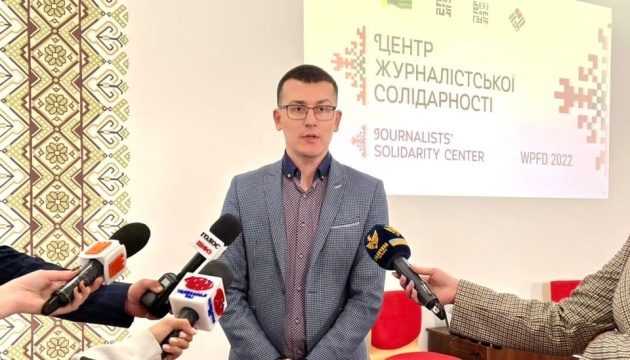
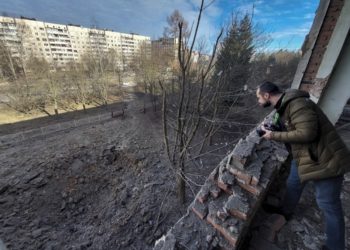
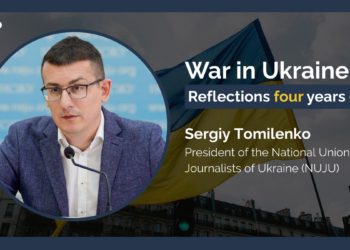
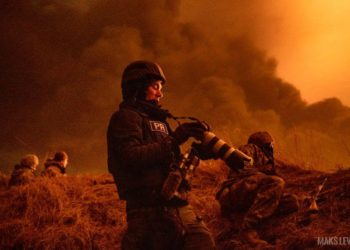













Discussion about this post